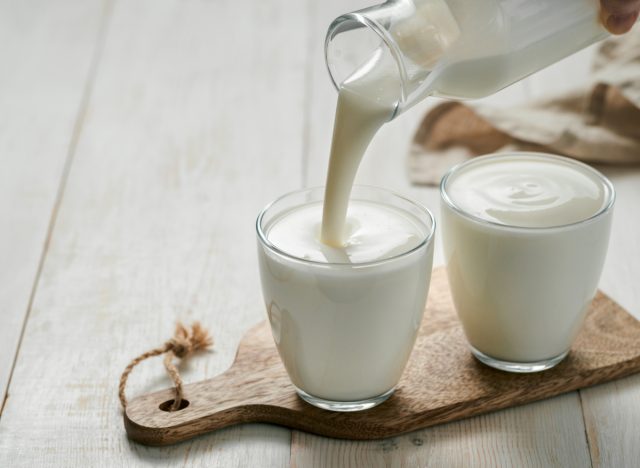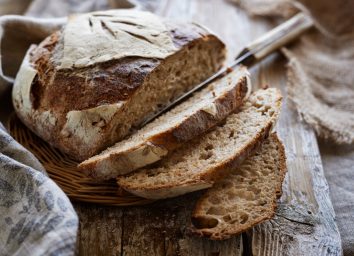Sneaky Habits That Ruin Your Gut Health As You Age

There are several significant routine steps to consider when it comes to enhancing your self-care and well-being. Good oral hygiene is essential to maintain a good set of pearly whites, and a solid skincare regimen is necessary to achieve a hydrated, radiant complexion. Seeing an optometrist for vision screenings is a must, and securing the right amount of sleep each night helps you re-charge your body. But one essential step in staying healthy that cannot be overlooked is being mindful of your gut health. You may have bad habits that negatively impact this area of your body, and we're going to explain why you need to change your routine.
Why is maintaining a healthy gut so critical, might you ask? Well, your gut is actually the core of your overall health. In fact, it's sometimes referred to as your "second brain," because the two organs work so closely together. Harvard Health explains to think about it in terms of when you get "butterflies" or "feel nauseous." Your brain directly affects your stomach, and your gastrointestinal tract reacts to your emotions. Feelings like happiness, sadness, anxiousness, and angriness can actually set off good (or bad) reactions in your gut (via Harvard Health).
It's necessary to keep learning about your gut, so you have a sense of just how important it is to treat it with respect. According to Well.org, many individuals would describe their gut as being their small and large intestines. That's incorrect, as your gut consists of your whole gastrointestinal tract. In fact, it covers most of your digestive system.
We spoke with Sunny Jain, CEO and founder of Sun Genomics about the sneaky daily habits that are destroying your gut health as you age. How do you effectively care for your gut health? Well, it's time to get rid of these bad habits, and Jain shares the most common ones you may have. Read on to learn more, and next up, be sure to check out The 6 Best Exercises for Strong and Toned Arms in 2022, Trainer Says.
You're not getting enough regular exercise

"Studies have shown that exercise is directly correlated with your gut microbiota's diversity (the number of beneficial functions your gut can perform). Being sedentary as we age isn't just bad for our muscles and longevity; it impacts our gut microbes and their function," Jain tells Eat This, Not That!
As far as how you can turn this bad habit around and work your way towards a healthier gut, Jain shares a solid mentality, "We need to begin thinking about feeding our gut microbes just as we think about feeding our human selves. I think of it like those Tamagotchi pet games from the 90s. Tamagotchi was a digital pet that you had to feed, exercise, and keep happy, and if you neglected it, it would just die."
Related: "Unhealthy" Workout Habits To Quit In Your 60s, Trainer Says
You're not eating the right things

Jain explains that in addition to exercise, your microbes need probiotics and vegetable fibers. If you're not sure where to begin with your diet, it's always a great idea to seek out advice from a certified nutritionist or registered dietician. In the meantime, Forbes reports shopping for items such as kefir, sauerkraut, kombucha, yogurt (non-dairy and dairy), and kimchi are awesome probiotic foods that will improve the number of good bacteria in your body. (Just be sure to scan the labels for "live, active cultures.") In addition, foods that have a high fiber content like dried fruits, fresh fruits (oranges, blackberries, blueberries), nuts, seeds, quinoa, and veggies (green peas, broccoli, white potatoes, winter squash) are key choices to incorporate into your diet.
Related: Drink This Much Water Each Day To Prevent Heart Failure, New Study Says
You're under too much stress

According to Jain, depression or physiological stress has been proven to cause "leaks" in your intestinal tract barriers (the part that separates the contents of your gut contents from your internal circulation and organs). This is commonly referred to as having a "leaky gut," a term you may already be familiar with. When stress inflammation takes over these barriers, it allows inflammatory gut microbes, along with their toxin, to head into your circulatory system.
Some tips on improving your gut health

Now that you know what you may be doing wrong, let's go over a few things you can do right. Jain suggests including a routine of endurance exercises, such as biking, jogging, hiking, and yoga. These activities offer controlled breathing, which is a great stress reducer and can enhance your circulation. This can be quite therapeutic when it comes to your gut microbes.
Keep in mind that it's important to not overdo any of the exercises you do. If you do perform them at an intense level, it's critical to control the impact your workout has on your gut microbiota. "As we think about our recovery process after exercise, consider your 'gut Tamagotchi,' and restrict the intake of a bunch of sugar that will feed the bad gut microbes and refuel with berries, plant fibers, and healthy proteins to feed the good microbes instead," offers Jain. You can also consider taking healthy microbes that can be found in fermented foods and probiotics. This can be very helpful in reducing the growth of microbes that are harmful to your gut.









